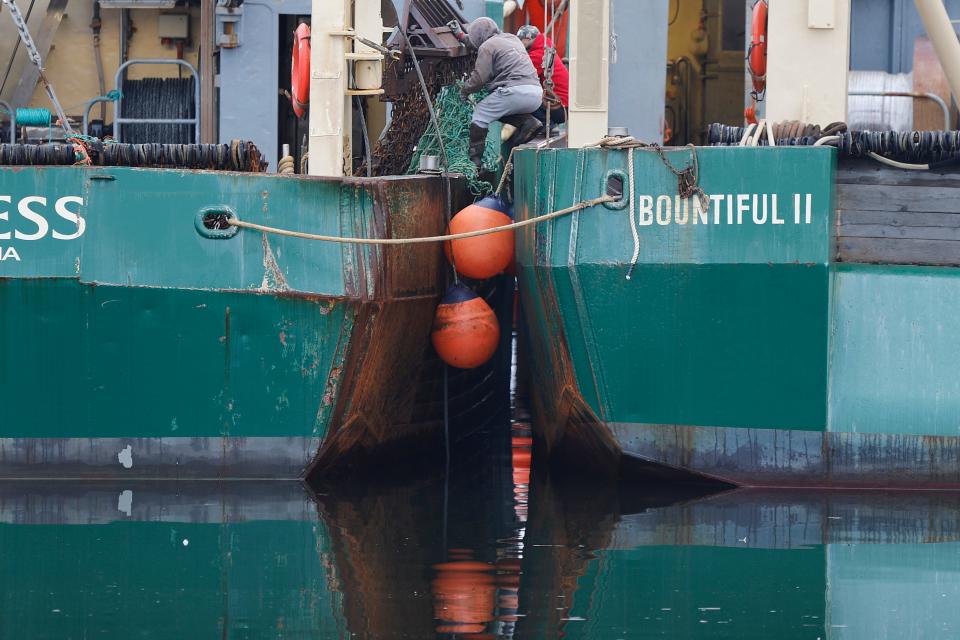New Bedford fishing industry considers compensation for offshore wind's impact
NEW BEDFORD — Fishing communities are looking to the federal government to determine the best way to compensate them for potential threats to their livelihoods from the offshore wind industry.
Massachusetts and eight other Atlantic Coast states proposed the establishment of a regional fisheries compensatory mitigation fund administrator.
In June, the U.S. Bureau of Ocean Energy Management (BOEM) issued a draft framework for mitigating impacts to commercial and recreational fisheries. Stakeholders have until Jan. 31 to submit comments to a Request for Information released by the states on Dec. 12 to guide the process.
New Bedford Port Authority Executive Director Gordon Carr said the initiative and leadership of the nine states and the extensive work involved in issuing the scoping document for a regional fisheries mitigation fund administrator and seeking stakeholder input through the RFI process is greatly appreciated.
“With the installation of offshore wind now imminent, it is a critically important step to develop a clear and verifiable fisheries mitigation and compensation framework to address impacts from offshore wind,” he said. “The Port of New Bedford has the most at stake in getting this right and ensuring that all involved – the commercial fishing industry, shoreside businesses, commercial ports, and the offshore wind developers themselves – have clarity on what the process will be and each of their responsibilities and requirements.”

“We are preparing detailed and comprehensive comments to the scoping document, and we hope the results lead to a path codifying at the federal level a structure for fisheries mitigation and compensation,’” he said.
New Bedford Mayor Jon Mitchell said the port has unique interests.
“We will continue to press state and federal policymakers to take into account the unique interests of New Bedford as the nation’s leading commercial fishing port,” he said. “In our view, the two most important mitigation considerations are ensuring access to mitigation funds for affected shoreside businesses in addition to vessels; and the importance of allocating funds commensurate with the value of the landings associated with respective ports.”
“We look forward to a collaborative effort to establish a fair and equitable policy framework that addresses these concerns,” Mitchell said.
Fishing industry supports mitigation
Representatives of the fishing industry requested an eight-week comment period to provide sufficient time for consideration of a scoping document in support of the RFI and time to prepare written comments.

The Responsible Offshore Development Alliance is a broad membership-based coalition of fishing industry associations and fishing companies committed to improving the compatibility of new offshore development with their businesses and has contributed to the process.
In a December press release, Lane Johnston, programs manager at RODA, said as providers of sustainable seafood, coalition members are deeply invested in protecting U.S. Fisheries.
“It is essential that impacted parties have a central role in designing and administering strategies that will most effectively mitigate impacts of offshore wind, and we look forward to continuing to refine an equitable and appropriate compensation strategy,” he said.
Overall, revenues are expected to decline between 3 and 15% for shellfish harvesters across the Northeast and mid-Atlantic, according to two Rutgers University studies funded by BOEM that focused on the impact on the Atlantic surfclam, according to a Rutgers University press release.
Total fleet revenue declines measured by the studies depended on the scale of offshore wind development and response of the fishing fleet.
The studies also determined the locations of the most vulnerable fleets and associated processors. Topping the list are fleets based in Atlantic City. The least affected port in the simulations was New Bedford, according to the release.
Based on the timeline included in the RFI, comments will be reviewed by the states with input from fishery advisors, NOAA, BOEM and the offshore wind industry.
The process for the selection of the regional fund administrator would be established this winter, and the compensation fund administrator would be selected this spring.
Standard-Times staff writer Kathryn Gallerani can be reached at kgallerani@gannett.com. Follow her on Twitter: @kgallreporter. Support local journalism by purchasing a digital or print subscription to The Standard-Times today.
This article originally appeared on Standard-Times: Offshore wind impacts on fishing under federal review

